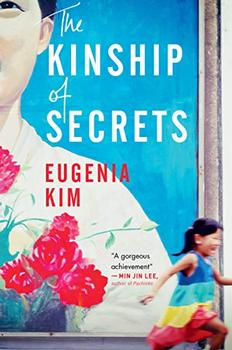Summary | Excerpt | Reading Guide | Reviews | Beyond the Book | Read-Alikes | Genres & Themes | Author Bio

This article relates to The Kinship of Secrets
 In Eugenia Kim's novel The Kinship of Secrets, sisters Inja and Miran are separated by the military action known in Western countries as the Korean War. Officially a "police action" – war was never declared – it is frequently referred to as "the Forgotten War" or the "Unknown War," as many Americans knew little about it due to government censorship of its coverage at the time. South Koreans generally refer to it as the six-two-five-war (yook-ee-oh junjeng) for the day and month in 1950 that the conflict began, while the North Koreans refer to it as the Fatherland Liberation War. China, which also became involved in the hostilities, officially calls it the War to Resist America and Aid Korea.
In Eugenia Kim's novel The Kinship of Secrets, sisters Inja and Miran are separated by the military action known in Western countries as the Korean War. Officially a "police action" – war was never declared – it is frequently referred to as "the Forgotten War" or the "Unknown War," as many Americans knew little about it due to government censorship of its coverage at the time. South Koreans generally refer to it as the six-two-five-war (yook-ee-oh junjeng) for the day and month in 1950 that the conflict began, while the North Koreans refer to it as the Fatherland Liberation War. China, which also became involved in the hostilities, officially calls it the War to Resist America and Aid Korea.
The Korean Peninsula was part of the Japanese Empire until Japan was defeated in World War II. In the aftermath, Japan's territories were divvied up between the victors, and both the United States and the USSR desired influence in Korea. The two countries agreed to share administration over the territory; the USSR would oversee the north, the USA the south, and the dividing line was set at latitude 38 degrees north – also known as the 38th Parallel. Each country backed a different leader and different ideology. In the south, the United States set up the US-educated Syngman Rhee as president in what was hoped would become a democracy. The USSR, meanwhile, installed Kim Il-sung as Chairman of the North Korean branch of the Communist Party, intending to establish Korea as a Communist state.
 Conflicts between North and South Korean troops along the 38th Parallel were common; nearly 10,000 soldiers were killed in skirmishes before the war began. Things came to a head on 25 June 1950, when Kim Il-sung sent approximately 75,000 troops over the border with the aim of invading the South Korean capital, Seoul.
Conflicts between North and South Korean troops along the 38th Parallel were common; nearly 10,000 soldiers were killed in skirmishes before the war began. Things came to a head on 25 June 1950, when Kim Il-sung sent approximately 75,000 troops over the border with the aim of invading the South Korean capital, Seoul.
The United Nations immediately condemned the action and encouraged its membership to support South Korea. Many Western countries saw the invasion as a Communist land-grab and were concerned that this particular fight was only the beginning; if the incursion went unopposed, they feared Communism would take over the world, and consequently their only option was to intervene. By July, troops arrived from the United States, Great Britain, Australia, Canada, India, New Zealand and South Africa; and General Douglas MacArthur was designated the commander of the combined UN forces.
At first the conflict went very badly for South Korea. The North Korean People's Army was more disciplined and more prepared to fight and made considerable headway. The turning point was an amphibious attack at Inchon launched by MacArthur which pushed the North Korean army out of Seoul and back across the 38th Parallel. American President Harry Truman and MacArthur decided, however, that the war should now be an offensive one with the goal of liberating the North from Communism. They continued the push up through the country to its border with China at the Yalu River. China's leader, Mao Zedong, considered this an act of aggression and sent Chinese troops into the fray, pushing the UN forces back south.
 A stalemate ensued, with no side gaining the upper hand. With China's involvement, Truman feared that the conflict could widen into another world war, and he consequently sought to negotiate an armistice with the North. (MacArthur disagreed and actually did all he could to provoke China, which got him fired for insubordination on 11 April 1951). Talks began in July 1951 and continued on and off for two years. The major sticking point was the repatriation of Korean prisoners of war; North Korea wanted to force all those the South had captured to return to North Korea, while South Korea wanted them to have a choice (because many of the detainees in the South were South Korean citizens who had been forced to fight with the Northern troops). The armistice was signed on 27 July 1953, with POWs allowed to decide where they'd live.
A stalemate ensued, with no side gaining the upper hand. With China's involvement, Truman feared that the conflict could widen into another world war, and he consequently sought to negotiate an armistice with the North. (MacArthur disagreed and actually did all he could to provoke China, which got him fired for insubordination on 11 April 1951). Talks began in July 1951 and continued on and off for two years. The major sticking point was the repatriation of Korean prisoners of war; North Korea wanted to force all those the South had captured to return to North Korea, while South Korea wanted them to have a choice (because many of the detainees in the South were South Korean citizens who had been forced to fight with the Northern troops). The armistice was signed on 27 July 1953, with POWs allowed to decide where they'd live.
It's unclear how many people were killed during this relatively short war, but it's estimated that the Koreans lost almost five million people, half of them civilians. The US incurred almost 40,000 deaths, with a further 100,000 injured. UN forces accounted for another 3,000 deaths. North Korea was flattened by US bombs, and North Koreans are taught that the war was a holocaust perpetrated by America. No peace agreement was ever signed and so technically the Korean War has not ended. In April 2018, the leaders of North and South Korea agreed to work toward a treaty that would formally end the war.
Combat in Seoul
General Douglas MacArthur, UN Command CiC (seated), observes the naval shelling of Incheon from USS Mount McKinley, 15 September 1950
Chinese troops crossing the Yalu River
by Kim Kovacs
Filed under People, Eras & Events
![]() This "beyond the book article" relates to The Kinship of Secrets. It originally ran in January 2019 and has been updated for the
November 2019 paperback edition.
Go to magazine.
This "beyond the book article" relates to The Kinship of Secrets. It originally ran in January 2019 and has been updated for the
November 2019 paperback edition.
Go to magazine.
Your guide toexceptional books
BookBrowse seeks out and recommends the best in contemporary fiction and nonfiction—books that not only engage and entertain but also deepen our understanding of ourselves and the world around us.